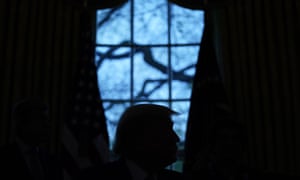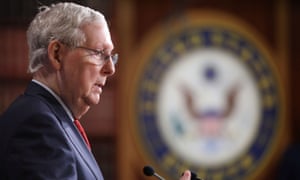Trump promised in 2016 to fill the courts with conservative judges – signaling to evangelical Christians and others he was a safe pick

Photograph: Evan Vucci/AP
Trump’s focus on judges started back on the 2016 campaign trail
Donald Trump made many promises on the campaign trail in 2016. He promised to build a border wall and make Mexico pay for it. He promised to resurrect American industry.
And he promised to fill the courts with conservative judges, understood to mean judges who were skeptical of environmental regulations, who were not enthralled with the legacy of the civil rights era and who took a narrow view of a woman’s right to choose.
To combat doubts about his conservative credentials, Trump took the unusual step of releasing, while still a candidate, a list of his potential picks for the US supreme court. The list was curated by the Federalist Society, the country’s largest organization of conservative legal activists. For evangelical Christians and other groups, the list signaled that Trump was a safe White House pick.
Has Trump delivered on his promises on judges?
As Trump’s first term winds down, there is no great border wall, and no resurgent manufacturing sector. But the highest hopes of Trump’s evangelical supporters have been realized, as the president has made good on his promise to fill the federal bench with a new brand of conservative judge – younger, more ideologically committed and less diverse than their peers.
At the circuit court level, Trump has installed 51 judges, or about 30% of all active judgeships, just one step before the US supreme court. He is preparing to fill dozens of district court vacancies. Most significantly of all, Trump has appointed two justices to the supreme court, Neil Gorsuch and Brett Kavanaugh, out of nine total.
Are the judges powerful?
Together these judges wield immense power over who gets to vote, who gets to marry, who has access to healthcare, who carries a gun, who is branded a criminal, who may join a union, who is protected from discrimination and who has permission to discriminate on religious grounds.
Pervasive influence on the federal judiciary is an immense prize, with implications spanning generations, given that federal judgeships are lifetime appointments. And it is a prize, analysts say, that Trump has handed the conservative movement, creating a powerful bulwark for his own political fortunes.
“These judges have all been vetted in terms of judicial philosophy,” said Sheldon Goldman, a professor of political science at the University of Massachusetts at Amherst who focuses on the federal bench. “All believe in a bench that is not activist in terms of promoting civil libertarian values. But they’re activist judges in terms of promoting the values that are important to them – property rights, pro-business, anti-regulation.”

How did Trump pick the judges?
Trump’s success at installing top-level judges – he has placed more, faster, than any previous president – has owed to the preparedness of outside groups in taking advantage of Republican control of both the presidency and the US Senate, which is in charge of confirming judges. Trump also has benefited from dozens of retirements by judges who were appointed by previous Republican presidents.
But his best friend in the effort has been Mitch McConnell, the Senate majority leader, who by blocking nominees under Barack Obama helped create 17 appeals court vacancies for Trump when he took office, more than any of his recent predecessors. McConnell also held a supreme court seat open for Trump, and he has changed Senate rules to speed the confirmation of Trump judges.
Have Trump’s judges made any impact yet?
While experts advise that it could take five years or more for the full picture to develop of how Trump’s judges are changing the courts, and the country, signs are emerging of a potential phase shift.
Formerly reliable progressive benches have issued rulings that threaten access to reproductive healthcare, while others have greenlighted the Trump administration’s most reckless attacks on voting rights and on vulnerable populations, from the disabled to victims of police abuse to asylum seekers.
The supreme court, meanwhile, has consistently sided with Trump administration requests for emergency relief from lower court rulings against executive actions by Trump to create a wealth test for green card applicants, divert Pentagon funding for a border wall, ban transgender individuals from the military and more.
What is at stake in these changes?
Goldman expressed general confidence in the health of the judiciary and said many Trump judicial appointees were qualified for their posts. But he warned of dire consequences if Trump’s judges gave in wholly to the president’s desire to prosecute his political enemies and destroy the free press.
“We have a president who has authoritarian instincts,” said Goldman. “We have a president who is rather vindictive. That’s really the big issue now – whether the constitution of the United States, the bill of rights, will survive Trump.”



